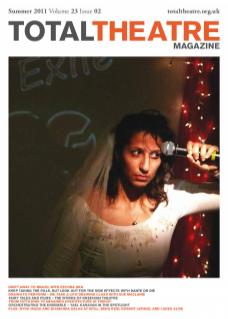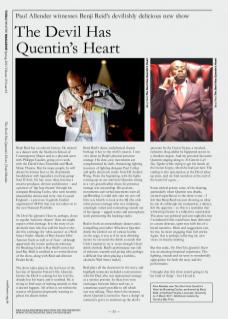Benji Reid has an eclectic history. He trained as a dancer with the Northern School of Contemporary Dance and as a physical actor with Philippe Gaulier, going on to work with the David Glass Ensemble and Black Mime Theatre. But for many people, he will always be known best as the charismatic breakdancer with legendary soul/rap group Soul II Soul. He has, since then, become a creative producer, devisor and director – and a pioneer of ‘hip hop theatre’ through his company Breaking Cycles, who were recently (shamefully) disinvested in by Arts Council England – a previous ‘regularly funded organisation’ (RFO) that was not taken on to the new National Portfolio.
The Devil Has Quentin’s Heart is, perhaps, closer to regular ‘narrative theatre’ than one might expect of this heritage. It is the story of an alcoholic man who has sold his heart to the devil in exchange for ‘ultra-success’ as a Wall Street Trader. Shades of Bret Easton Ellis’ American Psycho as well as of Faust – although apparently the source and main reference for Breaking Cycles is Ray Shell’s novel Iced (and Ray Shell is credited as co-writer/deviser of the show, along with Reid and director Peader Kirk).
The show takes place in the last hour of the last day of Quentin Forrest’s life. Quentin knows the Devil is coming for his soul (he already has his heart) and is terrified. He is trying to find ways of making amends so that it doesn’t happen. All of this is set within the context of Quentin desperately wanting to please his absent father.
Benji Reid’s dance and physical theatre heritage is key to the work’s success. I was very taken by Benji’s physical presence onstage. His slow, easy movements are complemented by dark, threatening lighting (courtesy of lighting designer Paul Colley) and spiky electronic music from DJ Andrew Wong. From the beginning, with the lights coming up on our anti-hero Quentin sitting in a very grand leather chair, his presence onstage was astounding. His posture, movements and verbal statements were all spellbinding. I could only take my eyes off him very briefly to look at the DJ (the only other person onstage) who was conjuring amazingly varied and contrasting sounds out of his laptop – jagged noises and atmospheric wails permeating the backing tracks.
Reid is both an extraordinary dancer and a compelling storyteller. Whenever Quentin drank the alcohol out of various bottles on the stage, it was as if he were drinking nectar: he savoured the drink so much that I felt I wanted to try it (even though I don’t drink alcohol). Reid’s performance was full of richness, warmth and giving (this perhaps a difficult feat when playing a ruthless, alcoholic Wall Street trader).
Reid plays all the characters in the story, and highlight moments included a conversation with his Dad, who was represented onstage as a sinister portrait. In these love-torn exchanges between father and son, it sometimes wasn’t possible to tell which one was talking. Then there’s the moment where Quentin is invited to ‘have a dump’ on someone’s grave to summon up the devil’s presence by the Green Gypsy, a wrecked, seductive drug addict he happened across in a drunken stupor. And my personal favourite: Quentin singing along to Al Green’s ‘Let’s Stay Together’ while trying to get his hands on the Green Gypsy, whom he had just met. The ending is also spectacular, as the Devil takes up arms, and we find ourselves at the end of the barrel of a gun…
Some critical points: some of the dancing, particularly when Quentin was drunk, seemed superfluous to the show to me – I felt that Benji Reid was just showing us what he can do (although my companion, a dancer, felt the opposite – so this is a reminder that witnessing theatre is a subjective experience). The piece was political and anti-capitalist, but I wondered if this could have been delivered in a more abstract, open way with less of a literal narrative. Hints and suggestions can, for me, be more engaging than full stories. Again, this is perhaps reflecting my own views on theatre-making.
But this aside, The Devil Has Quentin’s Heart was an amazing theatrical experience. The lighting, sounds and set were so wonderfully appropriate for both the story and the performance.
I thought that this show wasn’t going to be ‘my kind of thing’ – but I loved it.
Paul Allender saw The Devil Has Quentin’s Heart by Breaking Cycles, performed by Benji Reid, at Nuffield Theatre, Lancaster University on 4 March 2011. Additional material by Dorothy Max Prior.

